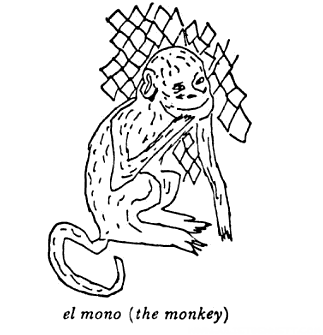I love it when Spanish words resemble their English equivalent. Madrigal’s Magic Key to Spanish, illustrated by Andy Warhol, is a cheat code for English speakers to learn Spanish. Carried out with a sense of humour too. See if you can guess these words: diferente; conveniente; elefante; producto; intereste; nación; universidad; usé... I’ve been recommending this book to so many people that I figure I should share it on here.

Some the cheat code:
Words that end in ‘or’ are often identical in Spanish: actor; doctor; tractor; color; error; favor. All you have to do is slightly change your vowels and accents.
Words that end in ‘al’ are also often identical in Spanish: animal; central; local; musical; legal; natural.
Words that end in ‘ble’ often don’t change: horrible; possible; flexible; probable; visible; inevitable.
Words that end in ‘ent’ or ‘ant’, just add an ‘e’: presidente; ecelente; accidente; conveniente; inteligente; imporante; el elefante.
Words that end in ‘ist’ just add an ‘a’: artista; dentista; capitalista.
Words that start with ‘s’ prefix with an ‘e’: especial (special), espiritual (spiritual).
Words that end in ‘ous’ change to ‘oso’: delicioso (delicious); famoso (famous); curioso (curous); nervioso (nervous); misterioso (mysterious); fabuloso (faboulous).
Words that end in ‘ly’ change to ‘mente’: absolutemente (absolutely); automaticamente (automatically); naturalmente (naturally); personalmente (personally); realmente (really/actually).
Words with ‘ph’ change to ‘f’: filosofia (philosophy), elefante (elephant).
Words that end in ‘ty’ change to ‘dad’: espiritualidad; (spirituality); curiosidad (curiosity); electricidad (electricity); personalidad (personality); humanidad (humanity).
Words that end in ‘ry’ change to ‘rio’: necesario; aniversario; extraordinario; contrario; diccionario; imaginario; involuntario; itinerario;
Words that end in ‘sion’ change to ‘sión’: decisión; discusión; comisión; confusión; conclusion.
Some words that end in ‘cal’ end in ‘co’ in Spanish: tipico (typical), logico (logical); identico (identical); etico (ethical); clasico (classical); economico (economical); politico (political).
Words that end in ‘ic’, add an ‘o’: artistico; acadmeico; burocratico; cientifico (scientific); democratico; fotografico; historico; ironico; magico.
Words that end in ‘tion’ convert simply to ‘ción’: invitación; anticipación; civilización; cooperación; generación; admiración; generación.
Pronunciation key:

Some words to remember:
que = what; donde = where; quien = who; cuando = when; como = how; porque = why.
y = and; bonita = beautiful; linda = beautiful; amor = love.
cuánto = how much; costó = cost.
tu or usted = you; va = go; mañana = morning.
antes = before; después = after
la izqueirda = left; la direcha = right;
Verbs:
| Examples of verbs | |||||
| verb ends with: | when applied to: | that is: | tener (have) | poder (can) | ser (be) |
| -o | I | yo | tengo | puedo | soy |
| -es | you | tú | tienes | puedes | eres |
| -en | he/she | él/ella/usted | tiene | puede | es |
| -emos | us | nosotros | tenemos | podemos | somos |
| -nen | they | ellos/ellas/ustedes | tienen | pueden | son |
Some prepositions to remember:
Use ‘es’ to say ‘is’ when something is permanent eg el banco es grande (the bank is big).
Use ‘esta’ to say ‘is’ when something is temporary, or when referring to a location eg el banco no esta limpo (the bank is not clean).
‘la’/’el’ = ‘the’ (masculine/feminine singular)
‘las’/’los’ = ‘the’ (masculine/feminine plural)
‘una’/’uno’ = ‘a’ or ‘an’ (masculine/feminine singular)
‘unas’/’unos’ = ‘a’ or ‘an’ (masculine/feminine plural)
Masculine & feminine:
Feminine = words that end in -d; -sion; -cion; -a
Masculine = words that end in -e; -o; -n; -l; -s; -z
Patterning the numbers:
| 0 | cero | 10 | diez | ||||
| 1 | uno | 11 | once | 100 | cien | ||
| 2 | dos | 12 | doce | 20 | veinte | 200 | doscientos |
| 3 | tres | 13 | trece | 30 | treinta | 300 | trescientos |
| 4 | cuatro | 14 | catorce | 40 | cuarenta | 400 | cuatrocientos |
| 5 | cinco | 15 | quince | 50 | cincuenta | 500 | quientos |
| 6 | seis | 16 | dieciseis | 60 | sesenta | 600 | seiscientos |
| 7 | siete | 17 | dieciseite | 70 | setenta | etc… | |
| 8 | ocho | 18 | dieciocho | 80 | ochenta | 1000 | un mil |
| 9 | nueve | 19 | diecinueve | 90 | noventa | 1,000,000 | un million |
This is just a sample of this magical book. It not only takes you through a pile of nouns and verbs, but helps you learn how to change verbs to different tenses, including the irregular ones and exceptions, and using simple exercises it helps you apply it and start putting together your own sentences from the get go. Did I mention I highly recommend this book?
If it weren’t for PROCRASTINATION and DISTRACTIONS I’d be fluent by now 😉 The fact that paying for lessons means you actually study is a good reason to still do lessons, even if reading this book is more effective… I’m a pretty self-motivated person, and yet when my paid Spanish classes finished, so did my reading of Madrigal’s key. That being said, the time I’d have been studying Spanish was replaced with studying philosophy (and a bit of falling asleep by the pool)… hence why another change in travel plans, but more on that another day.
This key makes me wonder what else can be made more simple. Tim Ferris seems to do it with a lot of things, from languages to swimming to the tango:
[youtube]http://www.youtube.com/watch?v=iPE2_iCCo0w[/youtube]
SIMPLICITY = cheat code to Spanish, and also maybe to life…
Hi.Do you have pdf version of this book? If yes then please share it.
Hi Rizawn, sorry I don’t have a PDF. It’s on Amazon and a worthy investment 🙂 http://www.amazon.com/Madrigals-Magic-Key-Spanish-Creative/dp/0385410956